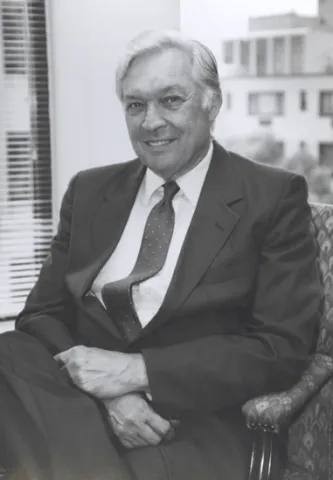
Former Rep. Robert W. Kastenmeier, in a 1993 photo
Representative Robert W. Kastenmeier “understood the federal courts like few others,” said Chief Justice William H. Rehnquist, who delivered the first annual Kastenmeier lecture in 1992 at the University of Wisconsin Law School.
“More importantly,” Rehnquist added, “he willingly became immersed in the nuts and bolts of judicial administration–a subject that gained him few newspaper headlines. … But his involvement served an important national interest and his legislative record attests to his effectiveness in that chosen role.”
Kastenmeier, who spent more than two decades as chair of the House subcommittee that had jurisdiction over the federal courts, died March 20 at the age of 91.
During his 32 years as a Congressman, Kastenmeier sponsored more than a dozen court-related legislative initiatives, including:
The Civil Justice Reform Act of 1990;
Legislation in 1980 that divided the Fifth Circuit into the Fifth and the new Eleventh Circuits;
The Federal Courts Improvement Act of 1982, which created the U.S. Court of Appeals for the Federal Circuit and the U.S. Claims Court;
The Magistrates Acts of 1976 and 1979, which expanded the responsibilities of magistrates;
The Bankruptcy Amendment and Federal Judgeship Act of 1984, which modernized bankruptcy court organization, and created additional Article III judgeships; and
The Judicial Council Reform and Judicial Conduct and Disability Act of 1980, which reconstituted the judicial councils and established procedures within the judiciary for handling complaints of judicial misconduct.
Kastenmeier supported legislation in 1988 to establish the Federal Courts Study Committee, served on the committee, and was a sponsor of the Federal Courts Administration Act of 1992, which enacted many of the committee’s recommendations impacting jurisdiction, financial administration, jurors, and various aspects of judicial administration.
After he left Congress in January 1991, Kastenmeier chaired the National Commission on Judicial Discipline and Removal, which in 1993 submitted recommendations to all three branches, including statutory changes that Congress subsequently adopted.
In 1984, a new U.S. district courthouse was constructed in the Western District of Wisconsin in Madison and named the Robert W. Kastenmeier U.S. Courthouse.
Judge Barbara Crabb, a senior district judge in Madison, first met Kastenmeier in the early 1970s, when she was a magistrate.
“He cared about the courts and wanted to make sure they did the job they were intended to do. He worked to get the necessary resources and to pass key court improvements legislation, but he also held us to the highest standards,” Crabb recalled in a phone interview this week. “He visited our court on a regular basis and he asked lots of questions. He wanted to know what was working and was not working. He was truly concerned about the business of the courts and the way it was being handled.”
Crabb said that much of Kastenmeier’s work in Congress laid the groundwork for the courts we see today.
“He would have approved and been proud of the cost containment and accountability we have in place in the federal courts,” she said.
Crabb kept up with Kastenmeier over the years, and delivered the University of Wisconsin Kastenmeier lecture herself in 2011. Her topic was Bridging the Divide Between Congress and the Courts.
Robert Katzmann, now chief judge of the U.S. Court of Appeals for the Second Circuit, recalls working with Kastenmeier after he left Congress.
“I went to him and asked if he might help me in a young enterprise, the Governance Institute—a small nonprofit organization based at Brookings, concerned in part with improving judicial-congressional relations,” Katzmann said this week. “Much to my amazement, he joined our efforts as a Distinguished Fellow, and played an important role in our activities.” This project, including an initiative that involves the courts of appeals’ sending to Congress judicial opinions that note possible errors in statutes, continues today.
When Kastenmeier ended his Congressional career, the Judicial Conference of the United States honored him for his “unwavering faith in the judicial process as a protector of individual rights under the Constitution and a guarantor of equal justice for all.”
In a ceremony at the Supreme Court in March 1991, Rehnquist presented Kastenmeier with a resolution, which recognized him for “tirelessly dedicating himself to working with members of the Federal Judiciary to improve the delivery of justice in this country.”
Kastenmeier also was widely recognized for his achievements in intellectual property legislation, which also was under the jurisdiction of the subcommittee he chaired. In particular, he sponsored legislation that made it easier for small businesses and universities to obtain patents.
In a January 1991 editorial, The American Judicature Society called Kastenmeier “… a torch-bearer for the improvement of the administration of justice.” Further, the editorial said: “The country is much the better for the tangible results of his dedicated service. Just as important as the legislation he promoted, however, is the example he set for how legislators can work with the judicial branch, not for each other, but for the public good in promoting effective and efficient administration of Justice.”
Chief Judge Katzmann recalled: “As a legislator, Bob Kastenmeier immersed himself in the nitty-gritty of issues, which had no political payoff but which were fundamental to the functioning of our democracy. In that regard, there was no better friend of the federal judiciary and defender of judicial independence than he. For Bob Kastenmeier, public service was a way of life.”
Subscribe to News Updates
Subscribe to be notified when the news section is updated.
